John Milton Paradise Lost Paradise Regained Samson Agonistes





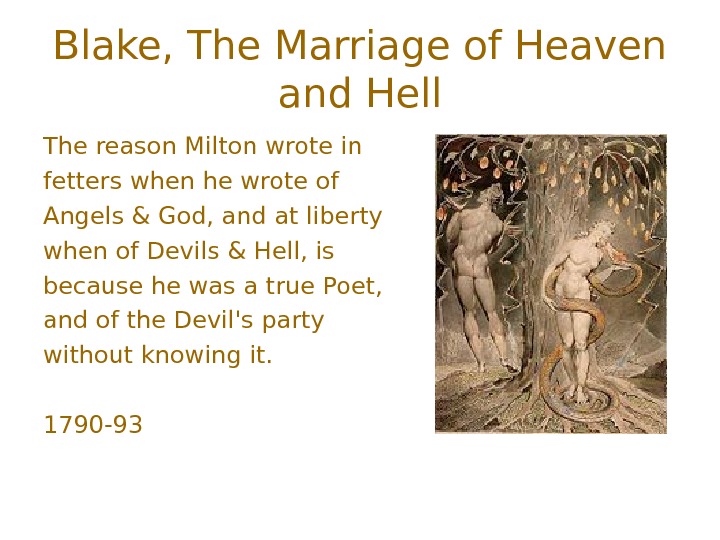

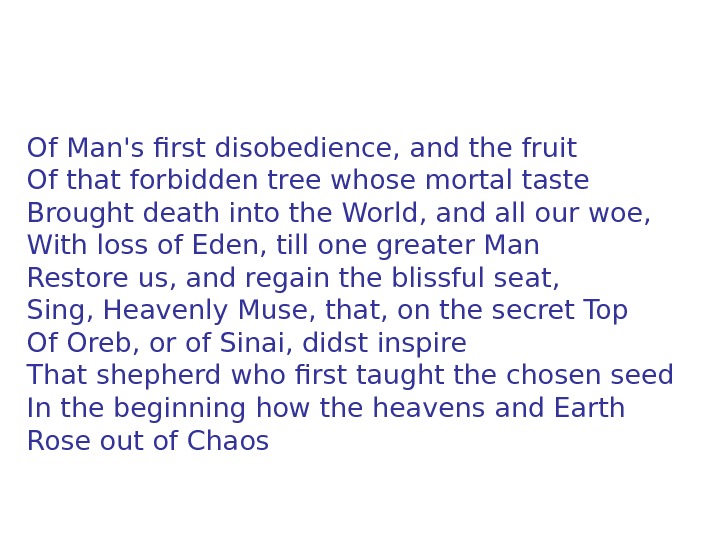

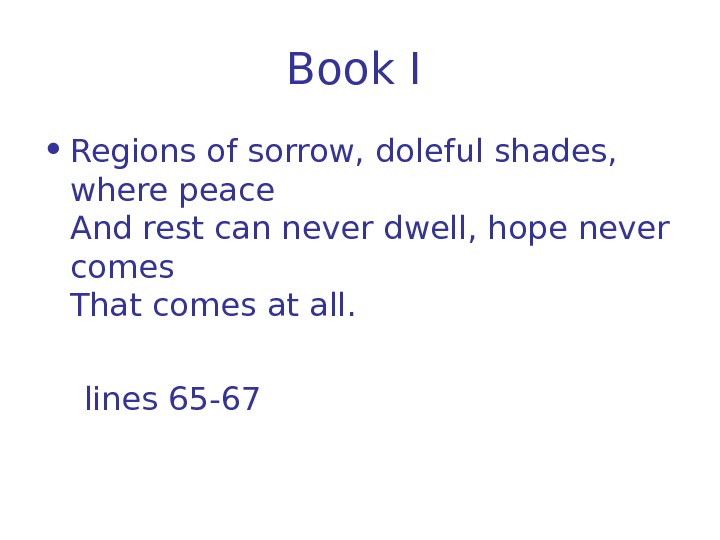


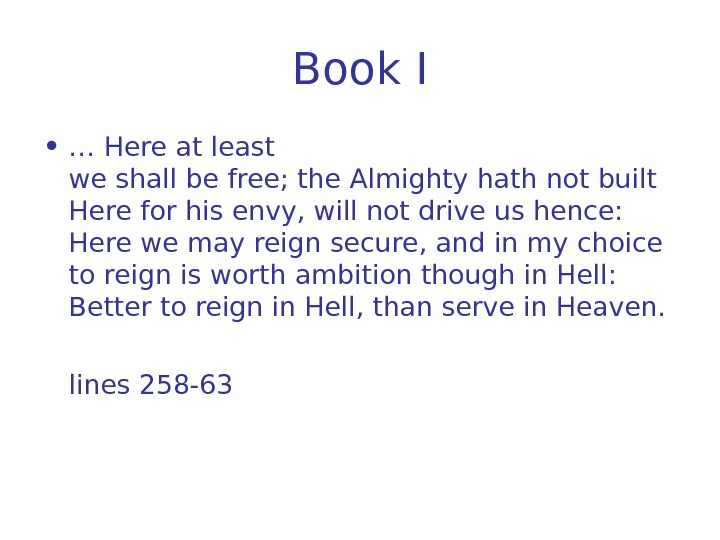













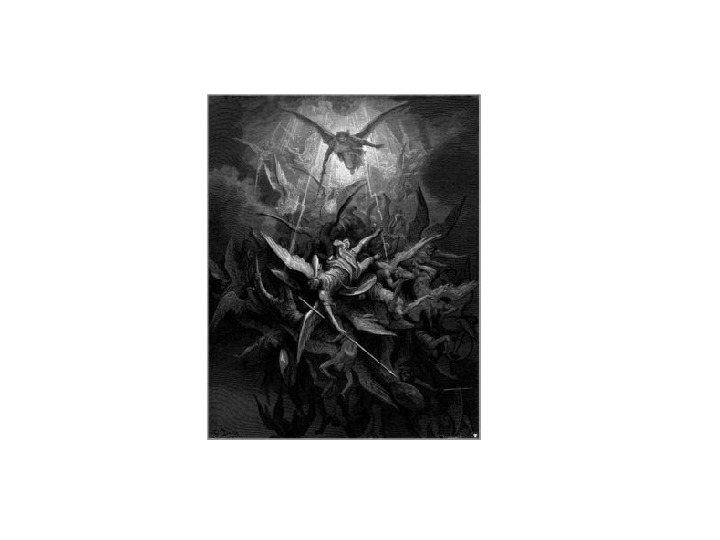
- Размер: 562.5 Кб
- Количество слайдов: 27
Описание презентации John Milton Paradise Lost Paradise Regained Samson Agonistes по слайдам
 John Milton Paradise Lost Paradise Regained Samson Agonistes
John Milton Paradise Lost Paradise Regained Samson Agonistes
 John Milton 1608–
John Milton 1608–
 John Milton
John Milton
 Title page of the first edition (1668) Milton began writing the epic in 1658, During the last years of the English Republic. The infighting among Different military and political f r actions that doomed the Republic may show up in the Council of Hell scenes in Book II. Although he probably finished the Work by 1664, Milton did not publish till 1667 on account of the Great Plague and the Great Fire.
Title page of the first edition (1668) Milton began writing the epic in 1658, During the last years of the English Republic. The infighting among Different military and political f r actions that doomed the Republic may show up in the Council of Hell scenes in Book II. Although he probably finished the Work by 1664, Milton did not publish till 1667 on account of the Great Plague and the Great Fire.

 Blake, The Marriage of Heaven and Hell The reason Milton wrote in fetters when he wrote of Angels & God, and at liberty when of Devils & Hell, is because he was a true Poet, and of the Devil’s party without knowing it. 1790 —
Blake, The Marriage of Heaven and Hell The reason Milton wrote in fetters when he wrote of Angels & God, and at liberty when of Devils & Hell, is because he was a true Poet, and of the Devil’s party without knowing it. 1790 —
 А. С. Пушкин «Мильтон говорит, что адское пламя давало только различать вечную тьму преисподней. . . Мы находим эти выражения смелыми, ибо они сильно и необыкновенно передают нам ясную мысль и поэтические картины»
А. С. Пушкин «Мильтон говорит, что адское пламя давало только различать вечную тьму преисподней. . . Мы находим эти выражения смелыми, ибо они сильно и необыкновенно передают нам ясную мысль и поэтические картины»
 Of Man’s first disobedience, and the fruit Of that forbidden tree whose mortal taste Brought death into the World, and all our woe, With loss of Eden, till one greater Man Restore us, and regain the blissful seat, Sing, Heavenly Muse, that, on the secret Top Of Oreb, or of Sinai, didst inspire That shepherd who first taught the chosen seed In the beginning how the heavens and Earth Rose out of Chaos
Of Man’s first disobedience, and the fruit Of that forbidden tree whose mortal taste Brought death into the World, and all our woe, With loss of Eden, till one greater Man Restore us, and regain the blissful seat, Sing, Heavenly Muse, that, on the secret Top Of Oreb, or of Sinai, didst inspire That shepherd who first taught the chosen seed In the beginning how the heavens and Earth Rose out of Chaos
 Перевод Арк. Штейнберга О первом преслушанье, о плоде Запретном, пагубном, что смерть принес И все невзгоды наши в этот мир, Людей лишил Эдема, до поры, Когда нас Величайший Человек Восставил, Рай блаженный нам вернул, Пой, Муза горняя! Сойди с вершин Таинственных Синая иль Хорива, Где был тобою пастырь вдохновлен, Начально поучавший свой народ Возникновенью Неба и Земли Из Хаоса;
Перевод Арк. Штейнберга О первом преслушанье, о плоде Запретном, пагубном, что смерть принес И все невзгоды наши в этот мир, Людей лишил Эдема, до поры, Когда нас Величайший Человек Восставил, Рай блаженный нам вернул, Пой, Муза горняя! Сойди с вершин Таинственных Синая иль Хорива, Где был тобою пастырь вдохновлен, Начально поучавший свой народ Возникновенью Неба и Земли Из Хаоса;
 Book I • Regions of sorrow, doleful shades, where peace And rest can never dwell, hope never comes That comes at all. lines 65 —
Book I • Regions of sorrow, doleful shades, where peace And rest can never dwell, hope never comes That comes at all. lines 65 —
 Дабы явить глазам кромешный мрак, Юдоль печали, царство горя, край, Где мира и покоя нет, куда Надежде, близкой всем, заказан путь,
Дабы явить глазам кромешный мрак, Юдоль печали, царство горя, край, Где мира и покоя нет, куда Надежде, близкой всем, заказан путь,
 Book I • A mind not to be changed by place or time. The mind is its own place, and in itself Can make a heav’n of hell, a hell of heav’n. lines 253 —
Book I • A mind not to be changed by place or time. The mind is its own place, and in itself Can make a heav’n of hell, a hell of heav’n. lines 253 —
 Book I • … Here at least we shall be free; the Almighty hath not built Here for his envy, will not drive us hence: Here we may reign secure, and in my choice to reign is worth ambition though in Hell: Better to reign in Hell, than serve in Heaven. lines 258 —
Book I • … Here at least we shall be free; the Almighty hath not built Here for his envy, will not drive us hence: Here we may reign secure, and in my choice to reign is worth ambition though in Hell: Better to reign in Hell, than serve in Heaven. lines 258 —
 Book I I • Long is the way And hard, that out of Hell leads up to Light. lines 432 —
Book I I • Long is the way And hard, that out of Hell leads up to Light. lines 432 —
 Book I I • With ruin upon ruin, rout on rout, Confusion worse confounded. lines 995 —
Book I I • With ruin upon ruin, rout on rout, Confusion worse confounded. lines 995 —
 Book I V • So farewell hope, and with hope farewell fear, Farewell remorse; all good to me is lost. Evil, be thou my good. lines 108 —
Book I V • So farewell hope, and with hope farewell fear, Farewell remorse; all good to me is lost. Evil, be thou my good. lines 108 —
 Book I V • So spake the Fiend, and with necessity, The tyrant’s plea, excused his devilish deeds. lines 393 —
Book I V • So spake the Fiend, and with necessity, The tyrant’s plea, excused his devilish deeds. lines 393 —
 Book V • Freely we serve, Because we freely love, as in our will To love or not; in this we stand or fall. lines 538 —
Book V • Freely we serve, Because we freely love, as in our will To love or not; in this we stand or fall. lines 538 —
 Book VIII • To know That which before us lies in daily life Is the prime wisdom. lines 192 —
Book VIII • To know That which before us lies in daily life Is the prime wisdom. lines 192 —
 Book IX • For solitude sometimes is best society, And short retirement urges sweet return. lines 249 —
Book IX • For solitude sometimes is best society, And short retirement urges sweet return. lines 249 —
 Book X I • For now I see Peace to corrupt no less than war to waste. line s 783 —
Book X I • For now I see Peace to corrupt no less than war to waste. line s 783 —






